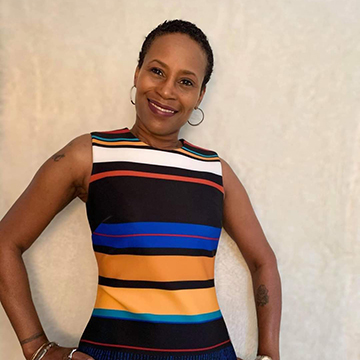Empowering Black businesses
Empowering Black businesses
Rosie Daniels' dream of owning a business started in her basement in the summer of 2019.
Now, less than two years later, the natural hair- and skin-care products from her business, LuLit’s Hair Essence, are on the shelves of Hy-Vee, and she credits a community business accelerator that had assistance from the University of Northern Iowa with helping her get there.
The Cedar Valley Black Business Entrepreneurship and Accelerator program was conceived by the 24/7 Black Leadership Advancement Consortium, a local non-profit dedicated to supporting Black professionals, as a way to support and develop the growth of local Black-owned businesses, particularly during the pandemic, which forced a disproportionate number of Black business owners to shut their doors.
The free, six-month program used the expertise of staff and faculty in UNI’s College of Business Administration, John Pappajohn Entrepreneurial Center and Business and Community Services to provide financial aid, business resilience, mentorship and scale strategies for minority-owned businesses. The first group of 12 businesses graduated from the program last month, and Daniels, pictured on the right, was one of four of those to have products placed in Hy-Vee.
Other businesses from the program with products sold at Hy-Vee includes ShinDigg, which sells inspirational apparel and accessories, The Shari Kollection, a luxury candle company, and AshleyJoy Cosmetics, which sells luxury cosmetics and accessories.
“The program has helped LuLit's Hair Essence tremendously. I am now able to reach more customers, work out my business plan and update different marketing strategies,” Daniels, a Mississippi native who moved to Evansdale in 2003, said. “The uplifting motivation and teamwork I've received from everyone in this program has been truly a life-changing experience, and I am thankful for the opportunity to now say that I am a part of this amazing program.”
UNI faculty and staff taught the business owners about customer discovery and targeting, helped them navigate the legal documents necessary for owning a business and connected them with business experts.
Lindi Roelofse, academic program manager for the John Pappajohn Entrepreneurial Center, had one of her classes work with some of the businesses owners to identify effective business strategies during the pandemic.
“Our early support has had a significant impact on the entrepreneurs, and, we hope, will have an even greater impact for the community in moving the needle to close the racial wealth gap, said Denita Gadson, student diversity programs coordinator and academic advisor for the CBA. “It's a simple act of allyship with the potential for huge returns for the businesses."
The conversation to start the program started last summer, when the 24/7 Black Leadership Advancement Consortium came together to discuss how to empower local black-owned businesses.
“Research across the nation showed that black-owned businesses were closing at the fastest rate because of COVID-19,” said Joy Briscoe, executive director of the consortium. “As a community, we couldn’t allow that to happen.”
But COVID-19 wasn’t the only challenge for these business owners. Many lacked formal business education. Others faced technological hurdles, such as owning a computer. But Briscoe said that a common challenge was difficulty building a relationship with a bank to acquire loans and capital.
“There's a hugely disproportionate amount of minority-owned businesses that don't have a relationship with the bank,” Briscoe said. “So when you talk about sustainability plans and loans and things to help keep afloat, if I don't have a banker, then I don't have access to that.”
This issue was illustrated by the disbursement of loans from the Paycheck Protection Program last summer. Of the approximately $43 million dollars of loans from the PPP awarded to Cedar Falls and Waterloo businesses last summer, less than 2% of those funds went to non-white-owned businesses, according to data from the U.S. Small Business Administration.
And the obstacles don’t stop there.
“There are many challenges as a Black business owner when working in a system that wasn't built for people who look like me,” Daniels said. “I have to prove myself even more to stand apart from everyone else. But I love what I do, and I'm loving this amazing journey with LuLit's Hair Essence.”
Today, 12 businesses in the Cedar Valley are better equipped to succeed, and the program already has a waiting list of businesses waiting to participate in the next round of the accelerator program.
“We are beyond honored to be able to serve the community,” Briscoe said. “It’s a privilege to be able to see the next generation of leaders thriving and see people's visions really manifest.”
And UNI will continue its work helping the program thrive.
“We wouldn't be at the point that we're at now without the huge support from UNI,” Briscoe said. “Pretty much every time we asked for something, they gave us what we needed, which is phenomenal.”




